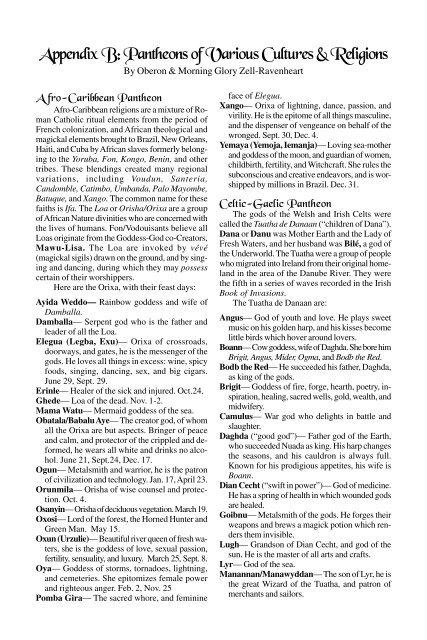Creating Circles and Ceremonies: Rituals for All ... - reading...
Creating Circles and Ceremonies: Rituals for All ... - reading...
Creating Circles and Ceremonies: Rituals for All ... - reading...
You also want an ePaper? Increase the reach of your titles
YUMPU automatically turns print PDFs into web optimized ePapers that Google loves.
270 <strong>Creating</strong> <strong>Circles</strong> & <strong>Ceremonies</strong><br />
Appendix B: Pantheons of Various Cultures & Religions<br />
By Oberon & Morning Glory Zell-Ravenheart<br />
A fro-Caribbean Pantheon<br />
Afro-Caribbean religions are a mixture of Roman<br />
Catholic ritual elements from the period of<br />
French colonization, <strong>and</strong> African theological <strong>and</strong><br />
magickal elements brought to Brazil, New Orleans,<br />
Haiti, <strong>and</strong> Cuba by African slaves <strong>for</strong>merly belonging<br />
to the Yoruba, Fon, Kongo, Benin, <strong>and</strong> other<br />
tribes. These blendings created many regional<br />
variations, including Voudun, Santeria,<br />
C<strong>and</strong>omble, Catimbo, Umb<strong>and</strong>a, Palo Mayombe,<br />
Batuque, <strong>and</strong> Xango. The common name <strong>for</strong> these<br />
faiths is Ifa. The Loa or Orisha/Orixa are a group<br />
of African Nature divinities who are concerned with<br />
the lives of humans. Fon/Vodouisants believe all<br />
Loas originate from the Goddess-God co-Creators,<br />
Mawu-Lisa. The Loa are invoked by vévé<br />
(magickal sigils) drawn on the ground, <strong>and</strong> by singing<br />
<strong>and</strong> dancing, during which they may possess<br />
certain of their worshippers.<br />
Here are the Orixa, with their feast days:<br />
Ayida Weddo— Rainbow goddess <strong>and</strong> wife of<br />
Damballa.<br />
Damballa— Serpent god who is the father <strong>and</strong><br />
leader of all the Loa.<br />
Elegua (Legba, Exu)— Orixa of crossroads,<br />
doorways, <strong>and</strong> gates, he is the messenger of the<br />
gods. He loves all things in excess: wine, spicy<br />
foods, singing, dancing, sex, <strong>and</strong> big cigars.<br />
June 29, Sept. 29.<br />
Erinle— Healer of the sick <strong>and</strong> injured. Oct.24.<br />
Ghede— Loa of the dead. Nov. 1-2.<br />
Mama Watu— Mermaid goddess of the sea.<br />
Obatala/Babalu Aye— The creator god, of whom<br />
all the Orixa are but aspects. Bringer of peace<br />
<strong>and</strong> calm, <strong>and</strong> protector of the crippled <strong>and</strong> de<strong>for</strong>med,<br />
he wears all white <strong>and</strong> drinks no alcohol.<br />
June 21, Sept.24, Dec. 17.<br />
Ogun— Metalsmith <strong>and</strong> warrior, he is the patron<br />
of civilization <strong>and</strong> technology. Jan. 17, April 23.<br />
Orunmila— Orisha of wise counsel <strong>and</strong> protection.<br />
Oct. 4.<br />
Osanyin— Orisha of deciduous vegetation. March 19.<br />
Oxosi— Lord of the <strong>for</strong>est, the Horned Hunter <strong>and</strong><br />
Green Man. May 15.<br />
Oxun (Urzulie)— Beautiful river queen of fresh waters,<br />
she is the goddess of love, sexual passion,<br />
fertility, sensuality, <strong>and</strong> luxury. March 25, Sept. 8.<br />
Oya— Goddess of storms, tornadoes, lightning,<br />
<strong>and</strong> cemeteries. She epitomizes female power<br />
<strong>and</strong> righteous anger. Feb. 2, Nov. 25<br />
Pomba Gira— The sacred whore, <strong>and</strong> feminine<br />
face of Elegua.<br />
Xango— Orixa of lightning, dance, passion, <strong>and</strong><br />
virility. He is the epitome of all things masculine,<br />
<strong>and</strong> the dispenser of vengeance on behalf of the<br />
wronged. Sept. 30, Dec. 4.<br />
Yemaya (Yemoja, Iemanja)— Loving sea-mother<br />
<strong>and</strong> goddess of the moon, <strong>and</strong> guardian of women,<br />
childbirth, fertility, <strong>and</strong> Witchcraft. She rules the<br />
subconscious <strong>and</strong> creative endeavors, <strong>and</strong> is worshipped<br />
by millions in Brazil. Dec. 31.<br />
Celtic-Gaelic Pantheon<br />
The gods of the Welsh <strong>and</strong> Irish Celts were<br />
called the Tuatha de Danaan (“children of Dana”).<br />
Dana or Danu was Mother Earth <strong>and</strong> the Lady of<br />
Fresh Waters, <strong>and</strong> her husb<strong>and</strong> was Bilé, a god of<br />
the Underworld. The Tuatha were a group of people<br />
who migrated into Irel<strong>and</strong> from their original homel<strong>and</strong><br />
in the area of the Danube River. They were<br />
the fifth in a series of waves recorded in the Irish<br />
Book of Invasions.<br />
The Tuatha de Danaan are:<br />
Angus— God of youth <strong>and</strong> love. He plays sweet<br />
music on his golden harp, <strong>and</strong> his kisses become<br />
little birds which hover around lovers.<br />
Boann— Cow goddess, wife of Daghda. She bore him<br />
Brigit, Angus, Mider, Ogma, <strong>and</strong> Bodb the Red.<br />
Bodb the Red— He succeeded his father, Daghda,<br />
as king of the gods.<br />
Brigit— Goddess of fire, <strong>for</strong>ge, hearth, poetry, inspiration,<br />
healing, sacred wells, gold, wealth, <strong>and</strong><br />
midwifery.<br />
Camulus— War god who delights in battle <strong>and</strong><br />
slaughter.<br />
Daghda (“good god”)— Father god of the Earth,<br />
who succeeded Nuada as king. His harp changes<br />
the seasons, <strong>and</strong> his cauldron is always full.<br />
Known <strong>for</strong> his prodigious appetites, his wife is<br />
Boann.<br />
Dian Cecht (“swift in power”)— God of medicine.<br />
He has a spring of health in which wounded gods<br />
are healed.<br />
Goibnu— Metalsmith of the gods. He <strong>for</strong>ges their<br />
weapons <strong>and</strong> brews a magick potion which renders<br />
them invisible.<br />
Lugh— Gr<strong>and</strong>son of Dian Cecht, <strong>and</strong> god of the<br />
sun. He is the master of all arts <strong>and</strong> crafts.<br />
Lyr— God of the sea.<br />
Manannan/Manawyddan— The son of Lyr, he is<br />
the great Wizard of the Tuatha, <strong>and</strong> patron of<br />
merchants <strong>and</strong> sailors.



